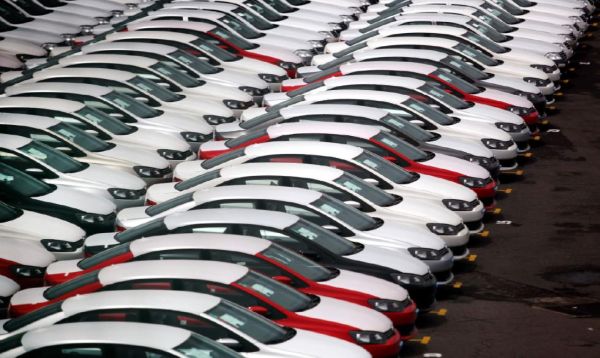Mexico's booming auto industry has reached a major milestone, claiming to have overtaken Japan as the second biggest car exporter to the United States in the past three months.
The Latin American nation now only trails Canada, but experts say Mexico could become the top exporter to its northern neighbor as soon as 2015, a potent symbol of its growing global clout in the sector.
Industry analysts had expected Mexico to surpass Japan by the end of the year, but the Mexican Automobile Industry Association (AMIA) says it has happened faster than expected. "It does not surprise me that they surpassed Japan, and that number will even get bigger," stated Haig Stoddard, industry analyst at Michigan-based WardsAuto Group.
The figure came in an AMIA report last week showing record production in the first quarter, with 774,731 units rolling out of plants in Mexico, a 6.5 percent increase from the same period last year.
AMIA, using its own statistics and WardsAuto figures, said the United States imported 428,376 "Made in Mexico" cars compared to 408,405 from Japan between January and March. Analysts say the figures are credible.
Latin America's second biggest economy has steadily grown as a global power in the auto industry, with most of the production destined for exports.
It is the world's eighth-biggest car maker and the number four exporter.
Relatively low wages, being next door to the massive US market and a raft of free trade deals with other nations have combined to make Mexico a prime location for carmakers.
"Mexico will continue to grow very strongly in the next five years," AMIA president Eduardo Solis said.
In addition to its ideal geographic location, Solis said, Mexico is a major auto parts supplier, home to a skilled workforce, and backed by a government that invites foreign investment.
Japanese flock to Mexico
Ironically, Japanese carmakers have helped Mexico become a manufacturing powerhouse, with Nissan, Mazda, and Honda building new factories in the country.
"They're building a lot more cars in the United States and Mexico," Stoddard said. "Going forward there's going to be more production in Mexico of Japanese cars."
In November, Nissan opened a $2 billion manufacturing complex in the central state of Aguascalientes, its third in Mexico, which will raise the company's output in Mexico by 25 percent to more than 850,000 vehicles per year.
In February, Honda inaugurated a sprawling $800 million assembly plant in the central state of Guanajuato, where it is producing the Honda Fit hatchback. That same month and in the same state, Mazda opened a $770 million factory to build compact models.
US and European automakers have also made huge investments in Mexico in recent years.
A US consultancy, IHS Automotive, predicted a few months ago that Mexico would surpass Japan this year as second exporter to the United States, sending 1.69 million units north, almost 200,000 more than the Asian nation.
"It's materializing a little bit quicker than we originally thought," said IHS Automotive analyst Guido Vildozo, who says that Mexico will beat Canada next year.
Japanese companies "are basically localizing production in the Americas, not only for the US market but also for the region as a whole," he said. "This is basically pushing Mexico into a higher role."
Original Story


